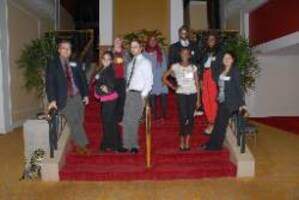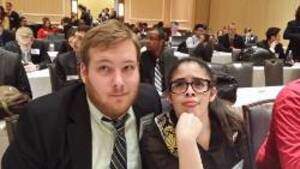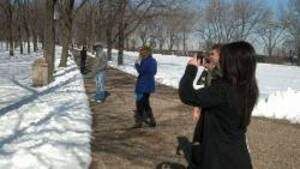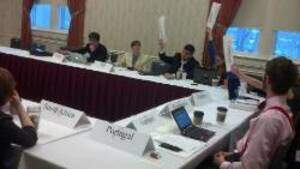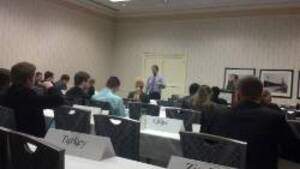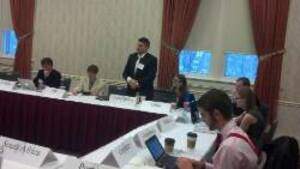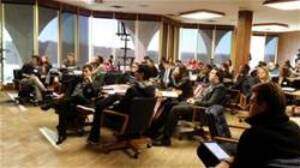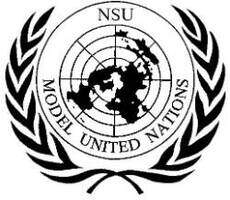Model United Nations
Model United Nations Program
Instructor: Dr. Cheryl Van Den Handel
Office Location: Seminary Hall 316
Email: vandenha@nsuok.edu
The Model United Nations (MUN) at NSU is a one-credit, pass/fail course that meets once per week throughout each semester to discuss global issues and to prepare for Model United Nations conferences and competitions. Model United Nations conferences and competitions are realistic role-playing simulations of the actual United Nations (the General Assembly, the Economic and Social Committee, the Security Council, the International Court of Justice), and other international organizations, such as the Arab League and European Union.
At the Model United Nations conferences, NSU students compete with hundreds, or thousands, of students coming from colleges all across the United States, in addition to a significant number of foreign students coming from abroad. Each student participates as a member of a delegation, with each college delegation representing assigned countries, and each country sending delegates to various bodies, committees, and councils. Individual students, as well as their colleges, compete for highly valued awards, recognition, and honors, based upon how well they have represented the interests of their assigned countries.
In the Fall semester, NSU sends a delegation of students to join approximately 350 college students and faculty from 30 colleges and universities at the American Model UN Conference (AMUN) in Chicago, Il. In the Spring semester we prepare a delegation for participation at the Midwest Model UN Conference (MMUN) in St. Louis, Mo. Occasionally, the team travels to New York City to the National Model UN, where they can participate with some 3500 student delegates from around the country.
By providing an ethnically and culturally diverse group of informed participants a forum for debate concerning global issues in a context that closely parallels the real world, the Model UN is a very effective form of active learning and a highly efficient method for teaching students the dynamics of multilateral diplomacy, international relations, and world affairs.
Why is Model U.N. useful to me?
Of course, Students from all academic majors are encouraged to participate, and anyone interested in political science, international business, social studies education, geography, history, or simply current events, will find the Model UN especially educational and rewarding. Parliamentary procedure, public speaking, debate, research, writing, active listening, networking, leadership, diplomacy, and negotiation are a few of the valuable skills one practices while participating. Furthermore, potential employers and graduate or professional schools acknowledge that extra-curricular activities such as the Model UN enhance one’s candidacy for admission or employment. Most of all, Model United Nations encourages the study of issues of international concern. In MUN we learn about the history, operation, and theory of the United Nations, and study the perspectives of foreign nations in the world that we represent at the intercollegiate conferences. Model UN is usually exciting, sometimes addicting, and always an excellent opportunity to learn about international affairs and foreign cultures.
Course Description
How do the nation-states of the world cooperate to manage international issues and problems? How do international organizations work? This course will introduce students to the philosophy and principles of international organization. We will examine specialized agencies and regional organizations, and we will address the broad range of issues with which these organizations try to deal. Typically, we’ll focus on four general issue-areas: collective security (war & terrorism); global and regional economic integration and social welfare; management of the global ecology; and human rights. We will also investigate how modern international organizations attempt to accomplish peacekeeping and nation building. To this end, students will research global issues and engage in country studies of the countries NSU will represent at the AMWEST MUN, NMUN, or MMUN Conferences.
Of course, students will be expected to keep track of current events. To facilitate participation, every student should read on a regular basis a major national newspaper (easily available on the Internet), and tune in to public broadcasting services such as “The News Hour” broadcast by PBS television, or “All Things Considered” broadcast by National Public Radio.
Course Requirements
Students will engage in the study of a country chosen from the available countries list for a specific conference, and based on this research (which is not to be limited entirely to the Internet), write position papers from the perspective of their assigned country on the issues specified in the conference agenda. Position papers can be submitted to the Position Papers' competition at the respective conferences.
Midwest MUN in St. Louis
